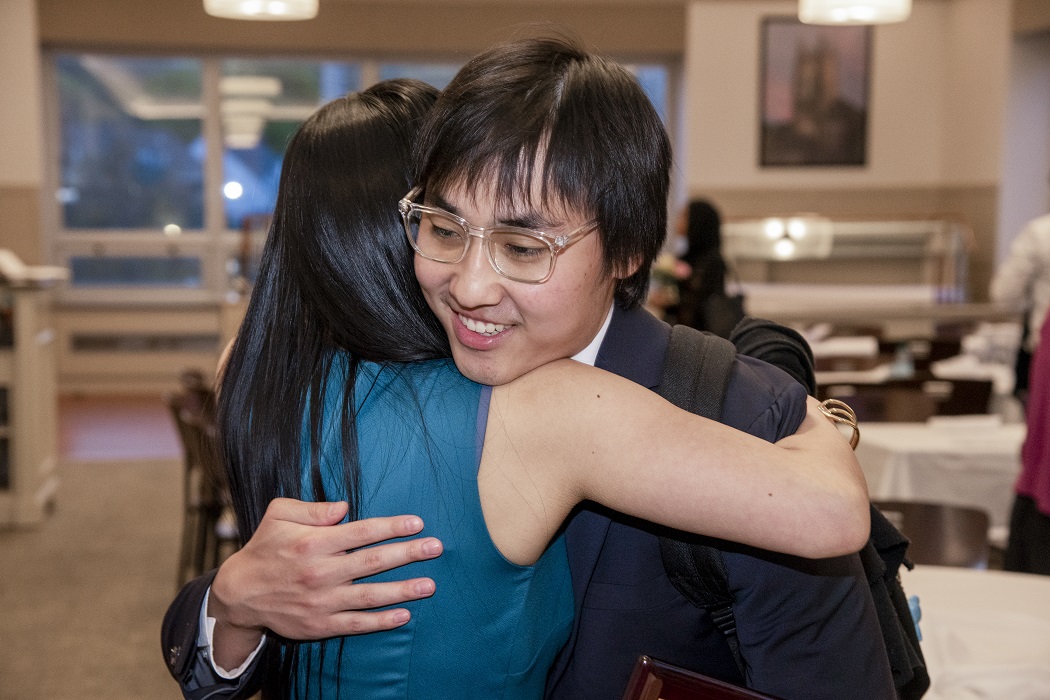
Dedicated to eliminating economic and educational barriers
Carroll School of Management junior Jadon Lee, whose passion for bridging economic and educational barriers stems from his formative years in the central Los Angeles neighborhood of Koreatown, is the winner of the Boston College 2025 Benigno and Corazon Aquino Scholarship.
Lee was presented with the award by University President William P. Leahy, S.J., at the annual Aquino Scholarship Banquet on April 29.
Awarded to a BC junior each spring, the scholarship recognizes a strong academic record, active engagement in Asian American issues, and service both on and off campus to the Asian American community. Lee was selected from among a highly competitive pool of applicants that also included Ella Chang, Joseph Ikossi Le, Julianne Nguyen, and Emily Sung.
The finance and accounting major’s commitment to empowering underserved communities is demonstrated through his youth mentorship, civic engagement, and cultural preservation efforts that strengthen both immigrant families and future Asian American and Pacific Islander (AAPI) leaders. Through leadership roles in the BC Symphony Orchestra and community work in Koreatown, Lee aims to transform finance into a tool for empowerment that fosters economic inclusion and uplifts immigrant and first-generation families.

Aquino Scholarship winner Jadon Lee '26 receives congratulations.
“Winning the Aquino Scholarship is both an honor and a deep affirmation of the values I hold firmly such as service, cultural identity, and leadership grounded in community,” said Lee. “As a Korean American student and child of immigrants, I’ve seen firsthand how barriers like language, financial illiteracy, and social exclusion impact our communities. This scholarship not only validates the work I’ve done with civic engagement initiatives in Koreatown and various programs at BC, but it also fuels my commitment to using finance as a tool for justice, inclusion, and intergenerational uplift.”
“Jadon is an extraordinary undergraduate, who impressed everyone on the scholarship committee with his work ethic and dedication to his family and the larger Asian American community,” said Associate Professor of Romance Languages and Literatures Wan Sonya Tang, director of Asian American Studies and head of the Aquino Scholarship selection committee. “At BC, he works two jobs while maintaining an almost perfect GPA, and he still manages to find the time to be deeply involved with the symphony.
“In LA, Jadon has been a steady leader in the Koreatown community, serving both youth and the elderly through tutoring, mentorship, and voter registration initiatives. What most impressed the committee was Jadon’s drive to help increase financial literacy and transform financial systems for immigrant and first-generation families. His commitment to economically empower disadvantaged communities makes us feel hopeful about the future.”
Lee is adamant that he will return to Los Angeles—home to the largest Korean American population in the United States, with over 300,000 residents of Korean descent—and specifically Koreatown, after graduation in 2026.
“Having watched my own parents struggle with documents and credit due to language barriers, I’m especially passionate about creating transparent, culturally competent services that empower rather than exclude. But beyond that, I have a deeper, long-term vision: I hope to return to academia to pursue a Ph.D. in finance and eventually become a professor.
“My goal is not only to contribute to research but to create inclusive learning environments where first-generation and AAPI students feel seen, heard, and empowered. I know how inaccessible finance can feel when you don’t see anyone who looks like you at the front of the classroom or leading the industry, and I want to change that. By mentoring the next generation of AAPI professionals, I hope to bridge the gap between financial knowledge and economic empowerment. Ultimately, I want to drive systemic change by transforming institutions from the inside out—ensuring that underrepresented communities, including my own, are not only included but equipped with the tools, confidence, and networks to thrive and lead.”
“ Having watched my own parents struggle with documents and credit due to language barriers, I’m especially passionate about creating transparent, culturally competent services that empower rather than exclude. ”
According to Lee, Koreatown—built by working-class Korean and Latinx immigrant families who first came to the neighborhood in the early 1900s—is undergoing rapid and complex change. While economic revitalization has brought new amenities, the impact of gentrification, commercial redevelopment, and rising socioeconomic inequality has displaced longtime residents and erased cultural landmarks.
Lee recounted a recent visit to the neighborhood when he passed by the site of a small Korean fried chicken shop he frequented as a child, whose owner always offered a smile and extra pickled radish. It was, he said, “a neighborhood fixture, a space where language, warmth, and cultural care came together.” In its place is a trendy café “that feels curated for culture rather than of culture.” He felt a sense of loss that wasn’t just personal: “It was communal.”
Lee noted that gentrification in ethnic enclaves like Koreatown is not solely a matter of rising property values; it’s deeply tied to issues of race, power, and representation.
“At its core, the struggle over gentrification reflects broader tensions around who gets to define a community, how cultural spaces are commodified, and whose stories are preserved or overwritten in the process.
“These insights profoundly affect how I see my role as someone pursuing finance. I don’t just want to study economic systems. I want to intervene in them. I want to fight for models of investment and development that honor the people who make neighborhoods like Koreatown what they are. I’m committed to challenging structures that reduce culture to branding and to uplifting policies that support cultural preservation, community-led development, and equitable housing. This is not just about resisting gentrification; it’s about reimagining who development is for and what justice looks like at the neighborhood level.”
